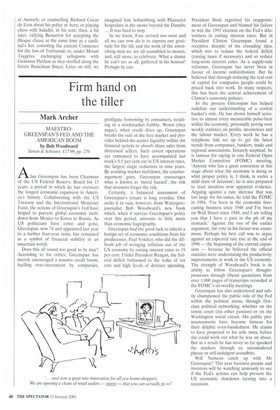Firm hand on the tiller
Mark Archer
MAESTRO: GREENSPAN'S FED AND THE AMERICAN BOOM by Bob Woodward Simon & Schuster, £17.99, pp. 270 Alan Greenspan has been Chairman of the US Federal Reserve Board for 13 years, a period in which he has overseen the longest economic expansion in America's history. Collaborating with the US Treasury and the International Monetary Fund, the actions of Greenspan's Fed have helped to prevent global economic meltdown from Mexico to Korea to Russia. As US politicians have come and gone, Greenspan, now 74 and appointed last year to a further four-year term, has remained as a symbol of financial stability in an uncertain world.
Does this all sound too good to be true? According to his critics, Greenspan has merely encouraged a massive credit boom, fuelling over-investment by companies, profligate borrowing by consumers, resulting in a stockmarket bubble. Worst (they argue), when credit dries up, Greenspan breaks the rule of the free market and provides behind-the-scenes liquidity within the financial system to absorb share sales from distressed sellers. Such covert operations are rumoured to have accompanied last week's 0.5 per cent cut in US interest rates, the largest single reduction in nine years. By avoiding market meltdown, the counterargument goes, Greenspan encourages what is known as 'moral hazard', the risk that investors forget the risk.
Certainly, a balanced assessment of Greenspan's tenure is long overdue. One seeks it in vain, however, from Watergatejournalist Bob Woodward's new book which, when it surveys Greenspan's policy over this period, amounts to little more than economic hagiography.
Greenspan had the good luck to inherit a benign set of economic conditions from his predecessor, Paul Volcker, who did the difficult job of wringing inflation out of the US economy by raising interest rates to 19 per cent Under President Reagan, the federal deficit ballooned in the wake of tax cuts and high levels of defence spending.






























































 Previous page
Previous page